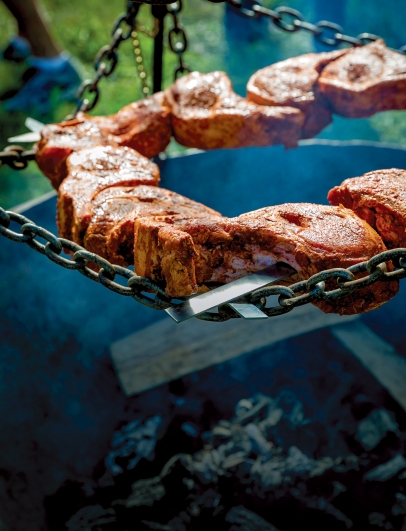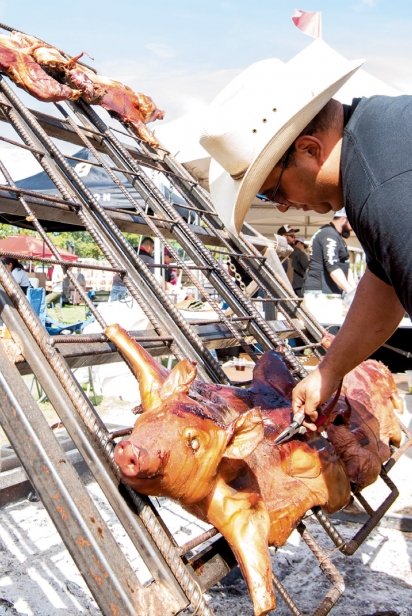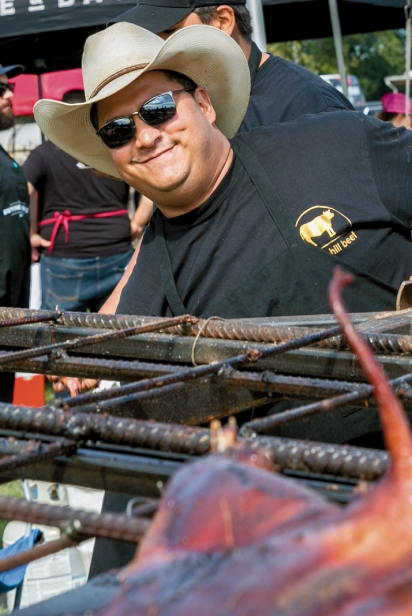Meet Felix Florez, Houston's Heritage Hog Rancher - Black Hill Meats
How Felix Florez found his calling as a Texan feeding Texans.
Felix Florez was working as a sommelier at Brennan’s of Houston in 2009 when he decided to start a side project. He had worked in the restaurant industry since he was a teenager and had noticed that chefs and restaurants used products from places like New Zealand, Australia, Kansas and Iowa. But why, he questioned, weren’t they using products from Texas?
Florez’s father grew up in a farming and ranching family in the Rio Grande Valley, so Florez knew what was available in our backyard.
“Because I had grown up with this agricultural influence in my life … it didn’t make sense to me,” he said. “I never understood why we would be ordering all of these products from other places when it’s all right here. So, the local bug sort of took over me before it was even a thing.”
With little money to spend on his project, Florez settled on pork. Pigs are not as expensive as cattle, they don’t require as much space, they grow quickly and they have lots of babies. “At the time if anybody talked about pork, they said one of two words: Berkshire or Kurobuta, which is also Berkshire, just from Japan,” said Florez, referring to the heritage pork breed. He set out to find Berkshire breeders and found a man in Abilene who sold him his first three pigs: a male and two females.
With those pigs and three acres in Cypress, Florez started Black Hill Meats, a business that with a network of small, independent ranchers, now supplies restaurants in Texas and other states with high-quality, sustainable meats, including heritage pork, beef, goat and lamb.
Since Florez was still working at Brennan’s when he started, he’d begin his days at 4:30am to tend to his pigs. He’d be back in bed by midnight after a long day at the restaurant and do it all over again the next day. As Florez learned more about pork, he uncovered other heritage breeds and started traveling the country on days off to get more breed stock. He wanted to offer that diversity of breeds to Texans, who at the time weren’t familiar with them. Business grew quickly, demanding more of Florez’s time and attention. At one point, Brennan’s general manager, Carl Walker, asked Florez, “Is it going to be wine or swine?”
Swine was the answer. Florez’s wife, Jeanette, who now works at Black Hill, encouraged him to take the leap. At first, Florez drove around with a blue monster cooler— the largest ice chest available in the United States; it fit five hogs—on the bed of his truck, making deliveries. He eventually customized a truck so he could hang the hogs in a refrigerated box, and in 2013 he got a space where he could do the butchery, because he realized that many restaurants didn’t know how to do it or just didn’t have the time and space to do so.
Lynette Hawkins, the chef-owner of Giacomo’s Cibo e Vino, is a customer who heard about Florez from a mutual friend. “I was so impressed that he was this talented chef who went into this business so that he could procure really good-quality, locally sourced, free-range pigs that foraged for their own food, and ate a healthy diet and were humanely raised and slaughtered, so that he could have a wonderful product because he saw there was a need for it,” she said. “I thought that was incredibly generous of him.”
The years of experience Florez had in the restaurant industry went hand in hand with his new venture. He knew whom to approach, what they were looking for, and the kind of service they expected. He also enjoys giving chefs menu ideas and introducing them to cuts they may not be familiar with, such as bavette steaks—a lesser-known cut of beef that is tender and flavorful and less expensive than the popular hanger steak—and beef and pork cheeks. Because Florez focuses on using the whole animal, he’s able to offer chefs cuts that are rarely offered by conventional purveyors.
While Florez processes and sells various meats, he only raises heritage pork breeds, including Berkshire, Hereford, Large Black, Meishan, Ossabaw and Iron Age. The resurgence of these breeds came as people realized that eating fat wasn’t as bad as it was said to be in the 1970s and ’80s. “That is when the slogan ‘pork: the other white meat’ came out,” said Florez. “And so, it was every producer’s goal to produce lean pigs. When you take the fat out of pork, or any meat for that matter, it’s dry, it’s flavorless, it’s tough.”
Heritage pork breeds have more fat, more marbling and, in turn, more flavor than commercial breeds, and each breed has unique characteristics that make it better suited for different culinary applications. Breeds like Berkshire, Tamworth and Hereford, for instance, are best for quick cooking. Others, like Mangalitsa and Ossabaw, are better suited for charcuterie or slow cooking due to their fat content and muscle size.
Even though Florez eventually moved to a 10-acre ranch in Katy, he realized that he couldn’t expand alone. Land is expensive and you need land to keep more animals. So he sought other livestock ranchers and asked them if they’d be interested in raising their different breeds naturally. “Most of them said, ‘Sure, if you’re going to buy it, absolutely,’” said Florez. “So, I made deals with a lot of different ranchers to grow things in a certain way.”
Black Hill’s pigs are raised on pasture with no antibiotics or hormones. When the pigs are young, Florez feeds them a high-protein diet that helps them grow fast, so they can ward off disease and predators. Once they’re grown, the focus becomes on building flavor, so the diet turns to oats, barley, rice, sunflower seeds, rice and corn.
By working with other ranchers, Florez is also able to keep up with demand. Aside from selling to restaurants in Houston like Giacomo’s, Helen Greek Food + Wine and Kata Robata, Florez also sells his meats all over Texas and in Florida and Louisiana. When asked how he ensures the quality of his products, he says: “I do a lot of driving.” Visiting the ranchers allows him to check in on them.
Nowadays, Florez splits his time between the butchery, picking up or dropping off livestock, on the ranch, dealing with customers, or at the restaurants he’s involved with. Florez is a partner at Blood Bros. BBQ in Bellaire and is working on opening Cherry Block inside Bravery Chef Hall in downtown Houston. Of Cherry Block, he says it’s a restaurant concept he has wanted to do for a long time. It’ll be meat-centric and will showcase products from Texas and whole-animal butchery.
Florez is also working on a project that will allow him to handle the slaughter— which is currently outsourced —and butchery of his animals under one roof. And, he has plans to open a retail butcher shop where people can walk in and buy cuts of meat.
“I think Americans have definitely identified the shortcomings and the problems with mass production of food, and I think being able to have that personal, intimate relationship with your butcher or your seafood monger, it’s becoming more and more important,” said Florez.






